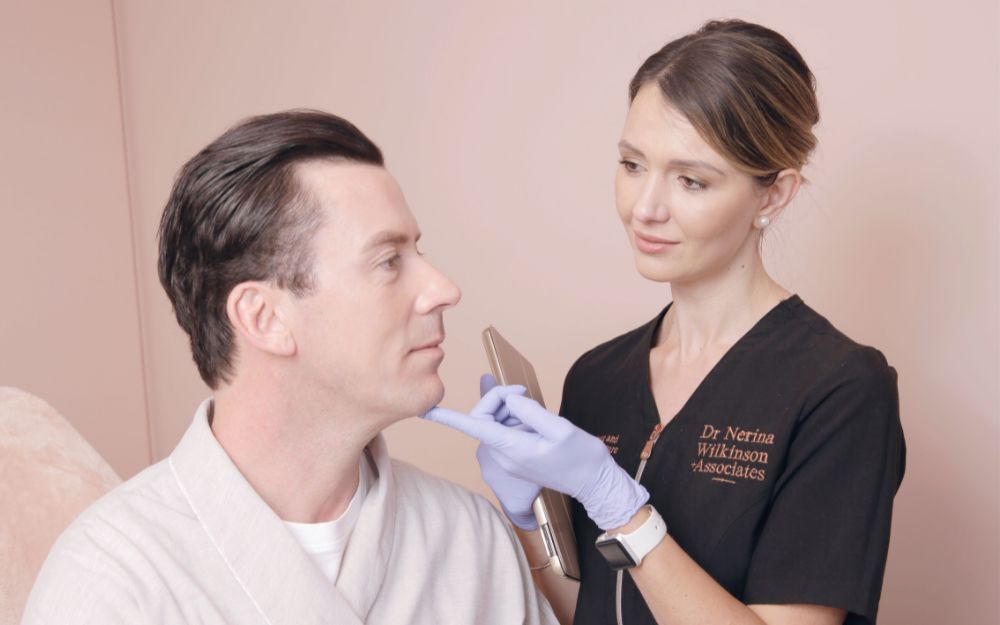by Senior Skin Care Specialist, Bernice Wolmarans
As society progresses, more and more men are recognizing the importance of taking care of their skin. But with an ever-increasing number of treatments, products, and home care routines to choose from, navigating the world of men’s skincare can be overwhelming. In this blog, we break it down into 6 essential steps to effective skincare for men, 2 of which involve simply reading!
Table of contents
- Debunking common myths about men’s skincare
- Understanding the different skin types
- Develop a daily skincare routine
- Choose the right skincare products
- Incorporate a healthy lifestyle
- Visit a skin care specialist regularly
Today we’ll cover tips on everything from cleansing and moisturizing to fighting wrinkles and targeting acne. So, whether you are a seasoned skin care aficionado or just getting started on a new male skincare journey, we’ve got you covered.
Before we get started… The importance of skin care cannot be overemphasized, as it not only enhances physical appearance but also protects against various skin-related illnesses, prevents premature aging (yes, men too, suffer from premature aging), prevents sun damage (which causes skin cancer, and other skin related problems such as wrinkles and age spots), helps control acne and breakouts (to prevent scarring and dark spots), and lastly reduces skin irritation.
Let’s dive into the 6 essential steps to effective skincare for men.
STEP 1: Debunking common myths about men’s skincare
Some men never even get started on skincare, and we have myths to thank for that. So to get going with a great skincare routine, we need to debunk some common myths first:
Men don’t need to use skincare products: This is a common and dangerous myth. Men’s skin is just as susceptible to environmental damage as women’s skin.
Men shouldn’t moisturize their skin: This is completely untrue. Moisturizing is an essential part of skincare for men.
Men don’t need to wear sunscreen: This is a dangerous myth that must be debunked. Men should use SPF daily, especially if they work outdoors or spend a lot of time in the sun.
Men don’t need to exfoliate: Exfoliating removes dead skin cells, which can clog pores, leading to breakouts. Men should exfoliate two to three times a week to keep their skin clean and healthy.
Men’s skin is tougher than women’s skin: Men’s skin is thicker, but this doesn’t mean it’s more resilient. Men’s skin can be sensitive and prone to irritation.
STEP 2: Understanding the different skin types
It is important to understand that there are many external and internal factors that can influence your genetic skin type and it’s therefore common to get your own skin type “wrong”. Due to this, men (and women) often follow the incorrect skincare which then leads to further skin-related concerns. Let’s cover the various skin types and what each of them means.
Normal Skin Type
A normal skin type is well-balanced and has few problems. It has a soft texture, small pores, and a healthy glow. Even though normal skin is often considered the most balanced, it is very important to maintain good skin quality and complexion to prevent challenges like occasional breakouts, irregular skin texture, and visible pores.
Dry Skin Type
Dry skin feels tight, flaky, and rough. Dry skin can experience several challenges such as dehydration, flakiness, and itching. Dry skin can also result in dull-looking skin, premature aging, and fine lines.
Oily Skin Type
Oily skin has large pores, a shiny appearance, and is prone to breakouts, blemishes, and blackheads due to the overproduction of sebum. Men are often more prone to oiliness on the skin due to the fact that they have larger oil glands. The upside to this is that it causes men’s skin to age slower!
Combination Skin Type
Combination skin poses a unique challenge as it is dry in some areas and oily in others. The T-zone (forehead, nose, and chin) is typically oily, while the cheeks and temples may be dry.
Sensitive Skin Type
Sensitive skin can react easily to irritants, leading to redness, itchiness, and inflammation. Sensitive skin is often fragile and can feel uncomfortable or tight after exposure to harsh skincare products. It is important to differentiate between sensitive skin (which one is born with) and reactive skin (which might be caused by impaired skin barrier function).
Unsure of which skin type you have? Here are a few steps you can take at home to help understand your skin type.
- Wash your face with a gentle cleanser and pat it dry with a clean towel
- Wait for about an hour and avoid touching your skin during this time
- After an hour, observe your skin in a well-lit area and determine which of the following categories it falls into:
- Oliy skin: Your skin looks shiny and feels greasy to the touch
- Dry skin: Your skin feels tight and flaky, and may have rough patches
- Normal skin: Your skin looks and feels balanced, with a healthy glow
- Combination skin: Your skin has some areas that are oily and some areas that are dry
Still unsure and want some help? At Dr Nerina Wilkinson + Associates we start each skincare journey with a VISIA Skin Analysis to ensure you have a good understanding of your skin type as it is key to providing you with the most suitable care and treatment for your skin. It will also help you choose the most relevant skincare products and establish a skincare regimen tailored to your individual skin needs and goals.
STEP 3: Develop a daily skincare routine
The ideal skincare routine has 7 simple steps. Yes, 7 might sound like a lot (and when you read below you’ll see it really isn’t), but considering that your skin is your largest organ we believe it deserves all the care it can get.
Cleanse: This step forms the foundation of your daily skincare routine. You may think that it is not as important, however, it is the first and crucial step that needs to happen in your morning and evening routine. Believe it or not, our skin regenerates at its peak between 2 am and 4 am, which is why our evening skincare routine is vital to prepare your skin for full absorption of active ingredients targeted at your specific skin concerns. With the regeneration process, our skin also goes through a “detox” phase; the reason we cannot skip our morning cleanse as we need to remove any impurities and any dead skin cells as a results of this.
Tone: This step varies from brand to brand, and is also a step that some people prefer and others not. In some cases this step is a second cleanse to make sure the skin is cleaned properly. In other cases, it might take the form of a mist that you will spray over your skin after cleansing to help reduce inflammation, add hydration, and bring down the pH balance of the skin.
Exfoliate: Men often struggle with clogged pores and oiliness (due to their increased oil secretions) which can lead to congestion, breakouts, and a dull appearance on the skin. Exfoliating your skin 2 – 3 times a week can assist your skin’s natural cell turnover process to help balance these concerns.
Support: When we look at skincare, we not only aim to give you a simple and easy routine but also an effective one that actually targets your concerns. And that is where serums come in. It is important to support your skin with the correct active ingredients which exist in high concentrations in the form of serums. When applying a serum, remember to wait a minute or two for the serum to absorb into your skin before applying the next layer.
Moisturise: Look at your moisturizer as a seal to lock in all the good ingredients that you applied to your skin. It will prevent dehydration and also protects your skin against all the environmental pollutants that break down the skin’s defense during the day.
Protect: This step is non-negotiable… It’s better to skip your hair care than to give this one a miss! Just kidding… you need both. Have you ever thought, “I don’t need skin protection as I’m always am always indoors”? Well, this is another myth we need to debunk! We all need skin protection in the form of SPF, whether we’re inside or outside, during winter and summer. Why? We are not only faced with harmful UVA & UVB rays but also with HIV (high visible lights) and Infrared rays which cause significant damage to the DNA of our cells and eventually have a cascade effect on the appearance and health of our skin.
Supplement: Taking daily supplements forms part of a holistic approach to skincare and will aid in a much better outcome when embarking on a skincare journey.
STEP 4: Choose the right skincare products
This is where it gets tricky for most. With so many skincare products on the market, how do we know which ones to choose?
There are a few “star” ingredients that most skin types need. Once these are in place, we then customize the skin journey by adding specific ingredients to target your skin’s individual needs and concerns. The “start” ingredients include growth factors; antioxidants, Retinol/Vitamin A, and SPF. Let’s cover a few tips to help you select the rest.
Choosing a skin cleanser
If you want to play it safe, we recommend going for a hydrating cleanser or gentle cleanser that will support the skin’s natural barrier function, versus a stronger cleanser that might be too drying. If you struggle with oiliness, you might think that you need a “drying” cleanser, but this will often only aggravate the oiliness. (Another reason why visiting a skin care specialist for guidance is of utmost importance)
For the busy man, there are also Micellar cleansing products available that you can simply wipe over your skin without using water. These products are also handy after training, during traveling, and if you don’t have water nearby.
Choosing a skin toner/mist
We often incorporate products like the Thoclor Labs GF1 spray as it supports the skin barrier function when dealing with and treating skin conditions such as acne, rosacea, and pigmentation. If your skin is simply in need of hydration, balance, and purification, a tonic mist might be a good idea.
Choosing skin serums and moisturizers
When it comes to choosing and using skin serums and moisturizers, it is vital to use them daily and in the correct way in order to see results. Because there are so many different skin types and concerns, and various products available to target these, we recommend either seeing us for a consultation or completing our online skin assessment to help you select the most suitable active ingredients for your serum and moisturizing routine.
Choosing a good SPF
This one is simple. Be sure to select a broad-spectrum SPF as this will protect your skin against all UV rays, HIV, and Infrared.
Choosing skin supplements
Skin supplements such as collagen-based products that include important vitamins and minerals will support not only your skin but your body as a whole. Omega’s such as krill oil and evening primrose oil also play a vital role in skin and oil production. This is another part of your skincare routine you might want to consult a specialist about…
STEP 5: Incorporate a healthy lifestyle
Easier said than done, this step is a more holistic approach to skin health and is unfortunately also non-negotiable when it comes to radiant, healthy skin.
We cannot stress this enough, one of the most important ways to take care of your skin is to protect it from the sun. A lifetime of sun exposure can cause wrinkles, age spots, and other skin-related problems — as well as increase the risk of skin cancer. But we’ve already covered the inclusion of SPF above. So what else?
Ditch the nicotine
Smoking makes your skin look older and contributes to wrinkles. it also narrows the tiny blood vessels in the outermost layers of the skin, which decreases blood flow and makes the skin appear paler. This also depletes the skin of oxygen and nutrients that are important to skin health. Smoking also damages collagen and elastin (the fibers that give your skin strength and elasticity).
Be gentle in the shower
Hot water and long showers or baths remove essential oils from your skin. A good skincare routine will therefore include using warm rather than hot water. When it comes to drying your skin, a pat is always best. After washing or bathing, gently pat or blot your skin dry with a towel so that some moisture remains on your skin.
Feed your skin from the inside out
A healthy diet can help you look and feel your best. Eat plenty of fruits, vegetables, whole grains, and lean proteins. Consider incorporating foods that are high in antioxidants. Antioxidants are compounds that may help delay or even prevent cell damage in the body. A wide variety of antioxidants occur in plant-based foods, such as blueberries, green leafy vegetables, cocoa, and beans. Antioxidants may help defend the body against oxidative stress from potentially harmful free radicals. It is also imperative to drink plenty of water to help keep your skin hydrated.
Take time to truly relax
Uncontrolled stress can aggravate skin sensitivity and also trigger acne breakouts and other skin problems. To encourage healthy skin (and a healthy state of mind) it is important to take the necessary steps to manage your stress levels. Make sure you get enough sleep, be kind to yourself when writing that to-do list, and make time to do things you really enjoy. The results might be more radiant than you expect.
STEP 6: Visit a skin care specialist regularly
As we know now, treating your skin with the wrong skincare routine can be detrimental. One way to make sure that you receive advice tailored to your skin concerns is to see a skin care specialist. Not only do you get individualized recommendations when doing so, but you can also trust that they are offering quality information backed by science, education, and experience.
In addition to this, being treated by a skin care specialist is the opportunity to amplify your skincare results with customizable and professional-grade skin treatments. The products and treatments reputable skin care specialists offer are often much more powerful than the products you have access to as a consumer and can treat visible concerns for optimal results and long-term skin health.
IN SUMMARY
Skin care plays an important role in your overall health and appearance. After all, your skin is the largest organ of your body. Understanding and following these simple steps to effective male skincare can help you achieve healthy (which is of the most importance) and radiant skin.
Should you be ready to make a change, email us at skinclinic@drnwilkinson.co.za to start your Skin Science journey to radiance today.
Written by Senior Skin Care Specialist, Bernice Wolmarans



